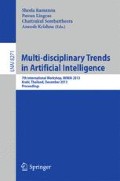Abstract
The aim of this paper is to provide a unifying axiomatic justification for a class of qualitative decision models comprising among others optimistic/pessimistic qualitative utilities, binary possibilistic utility, likelihood-based utility, Spohn’s disbelief function-based utility. All those criteria that are instances of Algebraic Expected Utility have been shown to be counterparts of Expected Utility thanks to a unifying axiomatization in a von Neumann-Morgenstern setting when non probabilistic decomposable uncertainty measures are used. Those criteria are based on ( ⊕ , ⊗ ) operators, counterpart of ( + , ×) used by Expected Utility, where ⊕ is an idempotent operator and ⊗ is a triangular norm. The axiomatization is lead in the Savage setting which is a more general setting than that of von Neumann-Morgenstern as here we do not assume that the uncertainty representation of the decision-maker is known.
Access this chapter
Tax calculation will be finalised at checkout
Purchases are for personal use only
Preview
Unable to display preview. Download preview PDF.
References
Fishburn, P.: Utility theory for decision making. Wiley (1970)
Allais, M.: Le comportement de l’homme rationnel devant le risque: critique des postulats de l’école américaine. Econometrica 21(53), 503–546
Ellsberg, D.: Risk, ambiguity, and the Savage axioms. Quarterly Journal of Economics 75, 643–669 (1961)
Dubois, D., Prade, H.: An introduction to possibilistic and fuzzy logics. In: Readings in Uncertain Reasoning, pp. 742–761. Morgan Kaufmann (1990)
Raufaste, E., da Silva Neves, R., Mariné, C.: Testing the descriptive validity of possibility theory in human judgements of uncertainty. Artificial Intelligence 148, 197–218 (2003)
Dubois, D., Godo, L., Prade, H., Zapico, A.: Advances in qualitative decision theory: Refined rankings. In: Monard, M.C., Sichman, J.S. (eds.) IBERAMIA-SBIA 2000. LNCS (LNAI), vol. 1952, pp. 427–436. Springer, Heidelberg (2000)
Dubois, D., Godo, L., Prade, H., Zapico, A.: Making decision in a qualitative setting: from decision under uncertainty to case-based decision. In: KR, vol. 6, pp. 594–607 (1998)
Giang, P., Shenoy, P.: A comparison of axiomatic approaches to qualitative decision making using possibility theory. In: UAI, vol. 17, pp. 162–170 (2001)
Giang, P., Shenoy, P.: Decision making on the sole basis of statistical likelihood. Artificial Intelligence 165, 137–163 (2005)
Giang, P., Shenoy, P.: A qualitative linear utility theory for spohn’s theory of epistemic beliefs. In: UAI, vol. 16, pp. 220–229 (2000)
Dubois, D., Prade, H., Sabbadin, R.: Qualitative decision theory with Sugeno integrals. In: UAI, vol. 14, pp. 121–128 (1998)
Weng, P.: An axiomatic approach to qualitative decision theory with binary possibilistic utility. In: ECAI, vol. 17, pp. 467–471 (2006)
Brafman, R., Tennenholtz, M.: On the axiomatization of qualitative decision criteria. In: AAAI, vol. 14, pp. 76–81 (1997)
Benferhat, S., Dubois, D., Kaci, S., Prade, H.: Bipolar possibilistic representations. In: UAI, vol. 18, pp. 45–52 (2002)
Gilboa, I.: Expected utility with purely subjective non-additive probabilities. Journal of Mathematical Economics 16, 65–88 (1987)
Schmeidler, D.: Subjective probability and expected utility without additivity. Econometrica 57, 571–587 (1989)
Dubois, D., Prade, H.: Fuzzy sets and systems: theory and applications. Academy Press (1980)
Dubois, D., Prade, H., Sabbadin, R.: Decision-theoretic foundations of qualitative possibility theory. European Journal of Operational Research 128, 459–478 (2001)
Weng, P.: Axiomatic foundations for a class of generalized expected utility: Algebraic expected utility. In: UAI, vol. 22, pp. 520–527 (2006)
Klement, E., Mesiar, R., Pap, E.: Triangular norms. Kluwer Academic Publishers (2000)
Author information
Authors and Affiliations
Editor information
Editors and Affiliations
Rights and permissions
Copyright information
© 2013 Springer-Verlag Berlin Heidelberg
About this paper
Cite this paper
Weng, P. (2013). Axiomatic Foundations of Generalized Qualitative Utility. In: Ramanna, S., Lingras, P., Sombattheera, C., Krishna, A. (eds) Multi-disciplinary Trends in Artificial Intelligence. MIWAI 2013. Lecture Notes in Computer Science(), vol 8271. Springer, Berlin, Heidelberg. https://doi.org/10.1007/978-3-642-44949-9_28
Download citation
DOI: https://doi.org/10.1007/978-3-642-44949-9_28
Publisher Name: Springer, Berlin, Heidelberg
Print ISBN: 978-3-642-44948-2
Online ISBN: 978-3-642-44949-9
eBook Packages: Computer ScienceComputer Science (R0)

